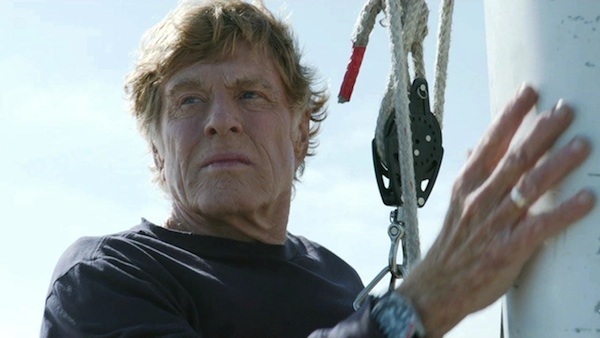All Is Lost Review
J.C. Chandor, as writer and director, might have his name all over All Is Lost, but make no mistake: this is Robert Redford‘s movie. With no one to play off of (or even speak to), he needs to shepherd us along a harrowing journey without any explicit reason to care about him or the journey’s outcome. Chandor and Redford literally give us nothing by way of background on the character, setting, etc. It’s just a man trying to survive, and while it’s not consistently enthralling throughout its 90 minutes, by the end, you’ll be stunned by how invested you’ve become.
The plight of the nameless man Redford plays starts with a wet cabin on his yacht, the Virginia Jean. It seems a shipping container, floating aimlessly on the Indian Ocean, has punctured a hole in the side of the vessel. It’s a problem, but the man takes the necessary precautions—patching the hole, draining the cabin—to prevent a bad situation from becoming worse. There’s no accounting for Mother Nature, however, and as he continues repairing his yacht, a brutal storm bears down on him and puts his resourcefulness to the test in a truly life-or-death way.
There’s no minimizing All Is Lost‘s stakes. Without electricity, enough food or fresh water, an intact method of transport, or a soul for hundreds of miles, this man’s chances of survival are, realistically, next to none, and that’s not even accounting for the occasional shark. But it isn’t human nature to dutifully accept defeat—especially when one’s life is on the line. So he tries to survive, and we as viewers grow to actively root for him.
Ultimately, it all comes back to Redford and his truly unique performance. It’s decidedly subdued work, of course. While we don’t know much about his character, the film opens with what sounds like a letter he’s written to someone back home. He’s regretful, but in his past, he clearly had trouble expressing himself. That sets us up well for 90 minutes of the most restrained desperation you’ve ever encountered, and while he can’t by himself make this the year’s most riveting film, that he makes it work at all is a testament to his tremendous skill. It’s probably the veteran’s finest film performance to date.
Credit for the film’s success must also go to the craftsmen, and Chandor, who put it all together and, through dynamite sound, production design, and visuals, make sense of this world without the aid of verbal context. The sound work, in particular, impressed me as I grew to dread every sound that came from this old ship. (Anybody else think Chandor would make one hell of a haunted house flick?) Every creak and crack—and there are many—could be the end as the strain from the damage, as well as the wind and water which are ever present, tear the ship apart.
All Is Lost isn’t the type of film that will win over the general public. Some will undoubtedly look at what Redford is doing and say anyone could play the part. That’s simplistic, of course, but partially true. Anyone could play the part, but as I said about Denzel Washington’s nuanced work in Flight, only a very particular type of actor can make the most out of a part like this. Redford is great here because we have a relationship with him. We fill in the blanks deliberately left by Chandor’s screenplay with things we know and feel about the actor. And as the film reaches its conclusion, you’ll cower in your chair, knuckles white from the tension, because you want to see Robert Redford find his way out of this mess. If that makes All Is Lost more a feat of casting than acting or directing, so be it. All I know is I thought the 77-year-old was outstanding, and the film itself quite memorable.
















